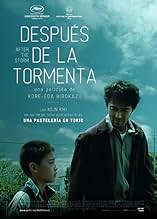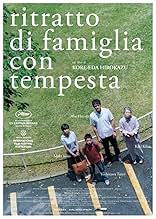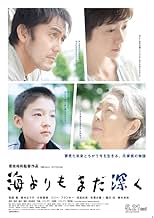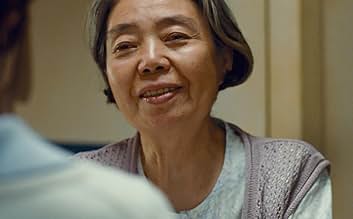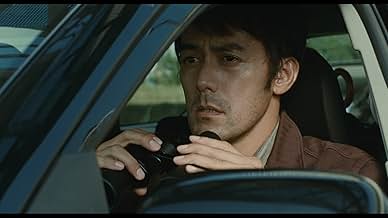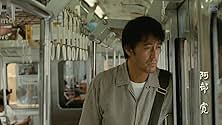IMDb-BEWERTUNG
7,4/10
13.751
IHRE BEWERTUNG
Nach dem Tod seines Vaters quält sich ein Privatdetektiv mit Unterhaltszahlungen ab und damit, wieder Zugang zu seinem Sohn und seiner Ex-Frau zu finden.Nach dem Tod seines Vaters quält sich ein Privatdetektiv mit Unterhaltszahlungen ab und damit, wieder Zugang zu seinem Sohn und seiner Ex-Frau zu finden.Nach dem Tod seines Vaters quält sich ein Privatdetektiv mit Unterhaltszahlungen ab und damit, wieder Zugang zu seinem Sohn und seiner Ex-Frau zu finden.
- Auszeichnungen
- 2 Gewinne & 13 Nominierungen insgesamt
Empfohlene Bewertungen
There are not many directors whose films I greet with enthusiasm, let alone Japanese ones. I think Hirokazu Koreeda is the only one. His films are a different breed - simple in design, but brilliant in architecture and sublime in closure.
Koreeda is the leading exponent in contemplative cinema. Under his minimalist approach, the essence of familial life and couplehood is distilled into abstract thoughts lingering like warm tendrils wrapped around your mind. The movie may be over but it refuses leave the confines of your consciousness and you would want to surrender to its warm lull again. The tone of After the Storm is pitch-perfect - nobody screams in your face, there are no pointing fingers, no low brow soap-opera. The acting is exquisite and nuanced. What is not said speaks louder than what is uttered. There is humour of the familiar kind; it is the kind of humour you laughed heartily because it is so familiar and you recognise the situations because you have gone through them before. There are not many filmmakers who are as sensitive as Koreeda. Above all else, this is a director who listens to characters' inner thoughts and emotions like an old master piano tuner and he knows how to calibrate the performances for everlasting emotional heft. For Koreeda, it is always about the small moments leading to the big truths.
After the Storm is not one of Koreeda's best films (it needlessly took too long to establish Ryota's character) but it easily transcends way above all the flashy films that inundate our cinemas like ants to candies. I wish I had a notebook last night because some of the metaphors are amazing. Here is one, asseverated by the grandmother Yoshiko, "The longer a stew sits, the more flavour it develops, just like people."
Koreeda is the leading exponent in contemplative cinema. Under his minimalist approach, the essence of familial life and couplehood is distilled into abstract thoughts lingering like warm tendrils wrapped around your mind. The movie may be over but it refuses leave the confines of your consciousness and you would want to surrender to its warm lull again. The tone of After the Storm is pitch-perfect - nobody screams in your face, there are no pointing fingers, no low brow soap-opera. The acting is exquisite and nuanced. What is not said speaks louder than what is uttered. There is humour of the familiar kind; it is the kind of humour you laughed heartily because it is so familiar and you recognise the situations because you have gone through them before. There are not many filmmakers who are as sensitive as Koreeda. Above all else, this is a director who listens to characters' inner thoughts and emotions like an old master piano tuner and he knows how to calibrate the performances for everlasting emotional heft. For Koreeda, it is always about the small moments leading to the big truths.
After the Storm is not one of Koreeda's best films (it needlessly took too long to establish Ryota's character) but it easily transcends way above all the flashy films that inundate our cinemas like ants to candies. I wish I had a notebook last night because some of the metaphors are amazing. Here is one, asseverated by the grandmother Yoshiko, "The longer a stew sits, the more flavour it develops, just like people."
Kore-eda is a renowned Japanese director for personable family dramas. His work in 'Still Walking' and 'Like Father, Like Son' (although yet to see) prove he is a capable writer when dealing with common family experiences. Marital woes, grief, father and son relationships. The list goes on. This being my first Kore-eda experience, I was unsure which angle to approach this blistering drama with. Regardless, no matter how I set my mind, it was an evocative and multi-layered drama with a masterful level of maturity. A novelist turned private detective, who is struggling for money due to a gambling addiction, coincidentally finds himself stuck at his mother's house overnight when a typhoon hits Japan. At the time the storm hits, his ex-wife and son are also there and spend the night within this claustrophobic environment.
Metaphorically speaking, the typhoon is a vivid representation of the estranged behaviour from both Ryota and Kyoko. Their differences splitting the family apart with such velocity. Yet, there is no hatred. No malice. And that is what I adore about Kore-eda's approach, it doesn't conform to typical clichés. He treats the audience like adults and executes a realistic family drama without needing any overly dramatic plots. Just two characters talking, with personable dialogue that has a surprising amount of wit, attempting to reconcile their differences for the betterment of themselves and their son. The storm acts as plot device for Ryota, allowing him to use the natural disaster to bond with his son. Then, once it subsides, life continues. A profound statement for most families.
Kore-eda explores various areas of urban Japanese culture, especially gambling and poverty, that enables this drama to be multi-layered. But what really cemented his masterful screenplay was just how it personal it was to him. Immediately the characters are bursting with dimensionality, enabling us to invest the time into their stories. Whilst also dealing with the scope of life, by indicating that "grown-ups cannot live only with love". A fascinating character study of a man who's personal ambitions get in the way of living life now. Though the narrative structure is not as fluid as the rain pummelling down from the storm, due to the abrupt transition between the first half before the storm and the second half, it still remains a rigid story.
This is helped by Abe's resourceful performance which was incredibly nuanced. Ryota is a complicated character, and Abe executed his complexions with ease. The late Kiki also gave a noteworthy performance as his mother, offering various lessons on life as she attempts to fix broken bonds within her family. Yamasaki's cinematography was gorgeous, cleanly enveloping you in Japan's natural and urban beauty. Kore-eda also frequently utilised long takes of unedited dialogue exchanges which subconsciously draws you into the drama.
Another small criticism would be the underutilisation of Kyoko's new boyfriend, whom of which could've been used more effectively to display her inner conflict for starting a new family or mending the existing bonds for the sake of her son. Small nitpicks here and there for what is a genuinely mature drama that felt both personal and personable, bolstered by sterling performances and a valuable screenplay. Am excited to see what Kore-eda has in store for us in the future. Oh, and bonus points for showcasing 'Taiko No Tatsujin' (I frickin' love that game...).
Metaphorically speaking, the typhoon is a vivid representation of the estranged behaviour from both Ryota and Kyoko. Their differences splitting the family apart with such velocity. Yet, there is no hatred. No malice. And that is what I adore about Kore-eda's approach, it doesn't conform to typical clichés. He treats the audience like adults and executes a realistic family drama without needing any overly dramatic plots. Just two characters talking, with personable dialogue that has a surprising amount of wit, attempting to reconcile their differences for the betterment of themselves and their son. The storm acts as plot device for Ryota, allowing him to use the natural disaster to bond with his son. Then, once it subsides, life continues. A profound statement for most families.
Kore-eda explores various areas of urban Japanese culture, especially gambling and poverty, that enables this drama to be multi-layered. But what really cemented his masterful screenplay was just how it personal it was to him. Immediately the characters are bursting with dimensionality, enabling us to invest the time into their stories. Whilst also dealing with the scope of life, by indicating that "grown-ups cannot live only with love". A fascinating character study of a man who's personal ambitions get in the way of living life now. Though the narrative structure is not as fluid as the rain pummelling down from the storm, due to the abrupt transition between the first half before the storm and the second half, it still remains a rigid story.
This is helped by Abe's resourceful performance which was incredibly nuanced. Ryota is a complicated character, and Abe executed his complexions with ease. The late Kiki also gave a noteworthy performance as his mother, offering various lessons on life as she attempts to fix broken bonds within her family. Yamasaki's cinematography was gorgeous, cleanly enveloping you in Japan's natural and urban beauty. Kore-eda also frequently utilised long takes of unedited dialogue exchanges which subconsciously draws you into the drama.
Another small criticism would be the underutilisation of Kyoko's new boyfriend, whom of which could've been used more effectively to display her inner conflict for starting a new family or mending the existing bonds for the sake of her son. Small nitpicks here and there for what is a genuinely mature drama that felt both personal and personable, bolstered by sterling performances and a valuable screenplay. Am excited to see what Kore-eda has in store for us in the future. Oh, and bonus points for showcasing 'Taiko No Tatsujin' (I frickin' love that game...).
Koreeda always knows how to make deep character portrayals that are calm on the surface but roiling underneath.
I bet we all can find the shadow of the underachieved protagonist in ourselves, as chances are really slim in materializing one's aspirations in the cruel reality. There he is: down-and-out both in career and mariage, scraping by through blackmailing strangers, yet always managing to squeeze a complacent smile on his face when meeting his family. You would presume he is leading a hopeless, listless, even miserable life, but the means by which the Japanese director narrates the story also attached a rather warm hue to the banal life of the man. In the end, what do we know about life without living it through ourselves?
Most films these days do not have something to 'say' anymore. They don't have a deeper meaning. And if they do, it's mostly superficial or so complex you don't really understand. 'After the Storm' by Hirokuzu Kore-eda has something to say, it's like a condensed moment of life. You will be dumbstruck by it's beauty.
The story deals with Ryota, struggling with financial problems, and trying to keep contact with his son after divorcement. He works as a private detective, spying on affairs and looking for lost cats while his real passion lies in writing literature.
The entire film is built around a central story part where they take shelter from a taifun, it involves scenes of such profound beauty, you will be moved to tears. The beauty lies in the things that are not spoken out, yet linger in the air like rain: the missed opportunities to be happy, love gone by and yet - still there.
To say the film deals with abandoned dreams in the face of reality is wrong, it's the contrary. The film says: If you keep waiting for beauty in life, you will not realize that it has already arrived. Just not the way you thought it would.
The story deals with Ryota, struggling with financial problems, and trying to keep contact with his son after divorcement. He works as a private detective, spying on affairs and looking for lost cats while his real passion lies in writing literature.
The entire film is built around a central story part where they take shelter from a taifun, it involves scenes of such profound beauty, you will be moved to tears. The beauty lies in the things that are not spoken out, yet linger in the air like rain: the missed opportunities to be happy, love gone by and yet - still there.
To say the film deals with abandoned dreams in the face of reality is wrong, it's the contrary. The film says: If you keep waiting for beauty in life, you will not realize that it has already arrived. Just not the way you thought it would.
Wusstest du schon
- WissenswertesAlbeit released later, this film wrapped earlier than Koreeda's previous film Unsere kleine Schwester (2015). The month-and-a-half filming of After the Storm took place starting in May 2014 in between the production of Our Little Sister, which was shot throughout a year.
- Zitate
Shinoda Yoshiko: I wonder why it is that men can't love the present. Either they just keep chasing whatever it is they've lost... or they keep dreaming beyond their reach.
- VerbindungenReferences Mein Nachbar Totoro (1988)
- SoundtracksShinkokyû
Music and lyrics by Takashi Nagazumi
Performed by Hanaregumi
Courtesy of Victor Records and Speedstar Records
Top-Auswahl
Melde dich zum Bewerten an und greife auf die Watchlist für personalisierte Empfehlungen zu.
- How long is After the Storm?Powered by Alexa
Details
- Erscheinungsdatum
- Herkunftsland
- Offizieller Standort
- Sprache
- Auch bekannt als
- Después de la tormenta
- Drehorte
- Kiyose, Tokio, Japan(Train station)
- Produktionsfirmen
- Weitere beteiligte Unternehmen bei IMDbPro anzeigen
Box Office
- Bruttoertrag in den USA und Kanada
- 272.132 $
- Eröffnungswochenende in den USA und in Kanada
- 27.880 $
- 19. März 2017
- Weltweiter Bruttoertrag
- 5.378.438 $
- Laufzeit
- 1 Std. 58 Min.(118 min)
- Farbe
- Sound-Mix
- Seitenverhältnis
- 1.85 : 1
Zu dieser Seite beitragen
Bearbeitung vorschlagen oder fehlenden Inhalt hinzufügen


